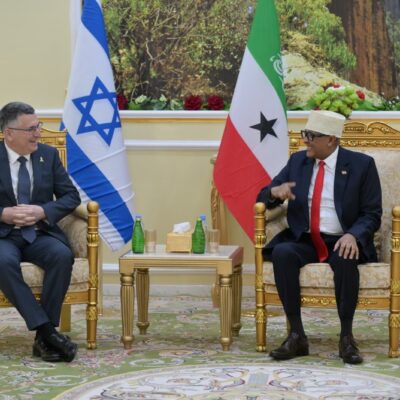
JACK GUEZ/AFP via Getty Images
Edelstein remains defiant amid Netanyahu moves to reinstate Haredi exemption from IDF
In an interview with ‘Jewish Insider,’ the Likud lawmaker questioned Netanyahu’s move to replace Defense Minister Yoav Gallant with Israel Katz, saying he was 'less certain that firing him is the right solution'
Foreign Affairs and Defense has long been the most prestigious and powerful of the Knesset’s committees, but in wartime, its oversight of all of Israel’s national security bodies takes on additional importance. The government of Israel is required to report to the committee declarations of war or operations that could lead to war, emergency call-ups of reserves, regulations related to a state of national emergency, and more.
The panel is also responsible for legislation related to national security — including a Haredi conscription bill.
Presiding over all of this throughout Israel’s multi-front war with Iranian proxies – with a higher security clearance and greater access to intelligence than most Israeli cabinet ministers and in some cases, even members of the smaller security cabinet – has been Likud lawmaker Yuli Edelstein.
Edelstein, 66, was born in the Soviet Union, in what is now Ukraine. As a young man, he applied for an exit visa to move to Israel and was rejected; he led a network of underground Hebrew teachers and was arrested by the KGB in 1984 and sent to the gulag. His name became well-known in the Free Soviet Jewry movement in Israel and the U.S., where President George H.W. Bush advocated for his release, which was secured in 1987.
Nearly a decade later, Edelstein was voted into the Knesset in the Natan Sharansky-led Yisrael BaAliyah Party, and served as immigration minister in Prime Minister Benjamin Netanyahu’s first government. He has been a legislator ever since, serving in numerous cabinet positions. He was Knesset speaker from 2013-2020, a job he lost amid a constitutional crisis over the Supreme Court’s authority vis-a-vis the Knesset, foreshadowing the political crisis sparked by judicial reform efforts last year.
As his showdown with the Supreme Court may suggest, Edelstein’s right-wing bona fides are well-established. But it’s not just the bogeymen of the Israeli right with whom he has fought. While he has been a Likudnik for more than 20 years, he has not hesitated to go up against the party’s leadership when he felt it has turned its back on the party’s underlying ideology. Edelstein, who resided in Gush Etzion in the West Bank for nearly three decades, was one of a small group of Likud lawmakers who resigned over the 2005 Gaza disengagement.
Now, it is his turn to again stand up for his principles: Edelstein announced last week that he would not support the “daycare centers bill” that would cancel one of the major sanctions against Haredim who dodged the IDF draft. A response was quick to arrive: Likud whip Ofir Katz barred Edelstein from submitting legislation for a month.
The man who stood up to the KGB did not take the punishment for standing up to Netanyahu too seriously.
“It was important [for the Likud] to show that my opposition didn’t pass unnoticed, and therefore they sanctioned me, but I smiled at this, after all my years in the Knesset,” Edelstein told Jewish Insider on Sunday.
Haredi conscription is the talk of the Knesset this week. The “daycare centers bill” that Edelstein and other Likudniks opposed was taken off the agenda hours before Netanyahu fired former Defense Minister Yoav Gallant last Tuesday. That, and the installation of Israel Katz, who was selected for the role in large part due to his backing of Netanyahu’s legislative priorities, have led many analysts to aver that passing a law by which very few Haredim will have to serve in the IDF, in the interest of saving his governing coalition, is the real reason Netanyahu dismissed Gallant. (Netanyahu said the reason was because of their ongoing disagreements over how to fight the current wars and the minister airing them in public; Gallant included the Haredi conscription dispute among several reasons.)
Edelstein summoned Netanyahu to a Foreign Affairs and Defense Committee meeting to defend the firing of a defense minister in the middle of a war; a date has not been set.
“I think there was a problem with their relations, but I am less certain that firing him is the right solution,” Edelstein said. “We can’t dispute the prime minister’s authority to dismiss a minister, but we can argue about his judgment. My job as Foreign Affairs and Defense Committee chairman is to make sure this issue doesn’t fall between the cracks … to make sure that everything is under control.”
With a more like-minded minister in place, Netanyahu and the Haredi parties, United Torah Judaism and Shas, may shift tactics from circumventing Gallant via the “daycare centers bill” to passing a comprehensive Haredi conscription bill from the Defense Ministry, which would bring few Haredim into the IDF. However, like any other security-related legislation, it would have to pass through Edelstein’s committee multiple times.
“My stance is not about who is sitting in the Prime Minister’s Office or the Defense Ministry,” Edelstein said. “It’s a matter of principle and it hasn’t changed. If the new defense minister and the system work hand in hand with us, we can have a good law. If it’s an attempt to bring a bill that is about exemptions and not service in the military, just to get this item off the agenda, I can’t support it.”
“The leadership of the ultra-Orthodox community still have not realized that something happened in this country and things can’t continue business as usual, so it wouldn’t be a bad idea if they would at least encourage part of their younger generation to contribute to the country through army service,” Edelstein said.
Edelstein sat for a wide-ranging interview with JI in his Knesset office last week, before Donald Trump was elected president for the second time and before Netanyahu fired Gallant, but Haredi conscription was high on the Knesset agenda.
“I have been trying to do my best for the last several months to reach an understanding about the draft legislation, but in the meantime I can’t boast about the results,” he quipped.
Edelstein identified two main obstacles to finding a solution for this decades-old problem: the Haredim and the IDF.
“The leadership of the ultra-Orthodox community still have not realized that something happened in this country and things can’t continue business as usual, so it wouldn’t be a bad idea if they would at least encourage part of their younger generation to contribute to the country through army service,” he said.
At the same time, Edelstein said that he was “disappointed with the IDF who were not exactly clear and goal-oriented in terms of drafting ultra-Orthodox youngsters to the army. I understand that it’s not that simple and you need some preparatory work, but if you are really serious about the necessity of additional soldiers to take at least some of the burden off of the shoulders of reserve duty soldiers and others, the army could be more enthusiastic.”
Edelstein was optimistic that a solution will be found because the current situation is in nobody’s interest – the IDF doesn’t have enough manpower and the Haredim, as draft-dodgers, will suffer from economic sanctions and be barred from leaving the country.
“I’m interested in answering the needs of the army. With all the fallen and wounded soldiers and those who spent the vast majority of the last year on reserve duty – it can’t go on like that. I’m doing my part, and I hope there will be partners,” he said.
While the Knesset debates who will serve in the IDF, the army has been on alert for a possible attack from Iran.
Edelstein said he was very impressed with Israel’s response to the Islamic Republic’s last missile attack, in which more than 100 Israeli Air Force planes flew over 1,000 miles to Iran, where they struck military sites, including aerial defense capabilities and missile-production sites.
“It’s very rare in the military experience that you see plans of attack in advance, and after the attack happens you don’t see any gaps with what happened in reality,” he said. “I totally approve of the goals that were chosen. I think it sent a very serious message to the Iranian regime that we can reach every square meter of Iranian territory.”
Yet the attack was not just about showing off Israel’s prowess.
Israel “struck certain capabilities and right now, I think they are learning and estimating what happened that day. I’m not sure they are pleased with the results,” he added.
Edelstein expressed alarm that the Iranian nuclear program has advanced to the point that breakout is “a matter of decision,” and that weaponization is unlikely to be a major obstacle because of Iran’s alliances with Russia and North Korea.
The veteran lawmaker said he thinks snapback sanctions, a mechanism bringing back all of the sanctions on Iran from 2015, would still be effective, even though “China, Russia and others are not exactly obliged by U.S. or European sanctions,” because of the damage it would cause to the Iranian economy.
“Other than the military option, it’s something practical that the world can do,” he stated.
Edelstein is one of the most outspoken Russia critics in Israeli politics, especially since Russia’s 2022 invasion of Ukraine.
He had misgivings about the possibility, reported in Israeli media, that Jerusalem and Moscow will cooperate once again, to stop Hezbollah from smuggling arms into Lebanon from Syria, where Russia has a large military presence.
“If we don’t want the effort of the last several months and weeks to be in vain, we need to make sure it is written in black and white that Israel keeps the right to control and impose demilitarization by itself. All the other talk and attempts by [United Nations Interim Force in Lebanon] and the Lebanese army … is not something that is doable. The Lebanese army is not in the mood to fight Hezbollah,” Edelstein said.
“Russia is strategically cooperating with Iran. They even depend on the Iranians for missiles, drones and other things. I am not saying that we shouldn’t try to coordinate what we can on the military level, as far as Syria is concerned. We are not interested in hurting Russians who are posted there … That’s the kind of coordination we can have,” he said.
However, Edelstein added, “to build on strategic cooperation would be a little bit naive.”
As for the possibility of a diplomatic solution for the Lebanese front of the war, Edelstein said, “It will all fall or hold based on one paragraph: Whether Israel itself will be able to impose control and destroy any attempt by Hezbollah to rebuild its military infrastructure and restart … its weapons production and smuggling.
“If we don’t want the effort of the last several months and weeks to be in vain, we need to make sure it is written in black and white that Israel keeps the right to control and impose demilitarization by itself. All the other talk and attempts by [United Nations Interim Force in Lebanon] and the Lebanese army … is not something that is doable. The Lebanese army is not in the mood to fight Hezbollah,” he said.
Asked if that requires a long-term Israeli presence in Lebanon, such as in 1982-2000, Edelstein said that it may not be the case, because Hezbollah is significantly weakened.
“The international community should try to take this chance to put Lebanon back on track,” he suggested. “Before the Palestinians arrived, it was referred to as the Switzerland of the Middle East … Israel can’t play any role here. We can fight Hezbollah and bring security to our border, but we can’t interfere with Lebanese politics. The U.S., France and others could definitely take this chance and try to bring the situation back to normality.”
As Foreign Affairs and Defense Committee chairman, Edelstein played a key role in advancing the laws effectively outlawing the U.N. Relief and Works Agency, which works with Palestinians, in Israel due to its extensive ties to Hamas and other terror organizations. With just over two months before the law goes into effect, the international community is pressing Jerusalem to come up with an alternative to the U.N. agency to distribute humanitarian aid in Gaza. The U.S. has already slowed down some military shipments, accusing Israel of not allowing enough aid into Gaza.
“UNRWA is totally infiltrated by Hamas,” Edelstein said. “We made it clear that UNRWA is out. Now, international organizations, volunteers, NGOs are all welcome if they want to take care of the population and not assist Hamas to stay in power … The average family in Gaza will only profit, because Hamas won’t be able to take 50, 60, 70% of the aid.”
As to whether friendly Arab states will step in to manage Gaza, Edelstein said Hamas is not yet sufficiently defeated.
“No sane country would come as long as Hamas is still in some kind of military and governmental control of Gaza,” he said. “The IDF has to make sure Hamas has been weakened to the point where they don’t present an immediate danger. It’s doable.”
“I have had difficult conversations in hundreds of meetings with the families of the hostages,” Edelstein said. “On some occasions … my guests would say, ‘Please say publicly that you are ready to pay any price, whatever it takes to release the hostages,’ and sometimes I would ask, ‘If Hamas demanded to rule Tel Aviv, is that reasonable?’ Then the families, serious people, said, ‘No, we don’t mean that.’ There are obviously limits, especially with terrorists like Hamas who have a big appetite and the moment we agree to something, they come back with additional demands.”
While there are countries that expressed interest in helping, Edelstein said “the devil is in the details,” as a number of countries have called for the involvement of the Palestinian Authority, which he views as a problem. “We need to look for local leadership, but only technocrats could be of use because neither the PLO nor Hamas can really run the area.”
Regarding negotiations to free the remaining 101 Israeli hostages in Gaza, Edelstein said “there’s always hope,” but called it “naive or romantic” to think that the IDF’s killing of Hamas leader Yahya Sinwar last month would have made it much easier to reach a deal. Still, he said, negotiations are necessary because a military operation to free all of the hostages is unlikely.
As to whether Israeli politics would get in the way of a potential cease-fire deal for Gaza, Edelstein said no.
“I have had difficult conversations in hundreds of meetings with the families of the hostages,” he said. “On some occasions … my guests would say, ‘Please say publicly that you are ready to pay any price, whatever it takes to release the hostages,’ and sometimes I would ask, ‘If Hamas demanded to rule Tel Aviv, is that reasonable?’ Then the families, serious people, said, ‘No, we don’t mean that.’ There are obviously limits, especially with terrorists like Hamas who have a big appetite and the moment we agree to something, they come back with additional demands.”
At the same time, he said, “We have to admit that there will be concessions, including the release of the worst terrorists we can imagine. There will be a price. In the situation that we are in, where we failed to protect our population on Oct. 7, that is the price the government has to pay.”
“I think this painful issue is strategically important, because we can’t really finish the operation in Gaza without bringing the hostages back,” Edelstein said.
In a call with JI on Sunday, Edelstein fell short of some of his right-wing colleagues’ elated responses to Trump’s victory, simply saying that he “hope[s] very much that we will work with the new administration in a coordinated way, because there is no doubt that with everything happening in our region … the American stance can influence developments.”






